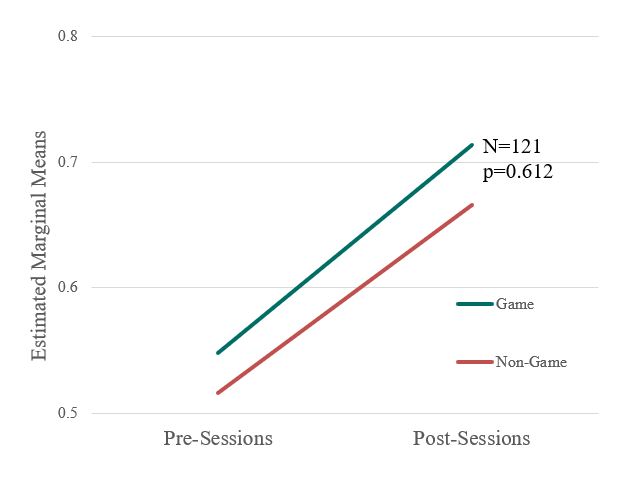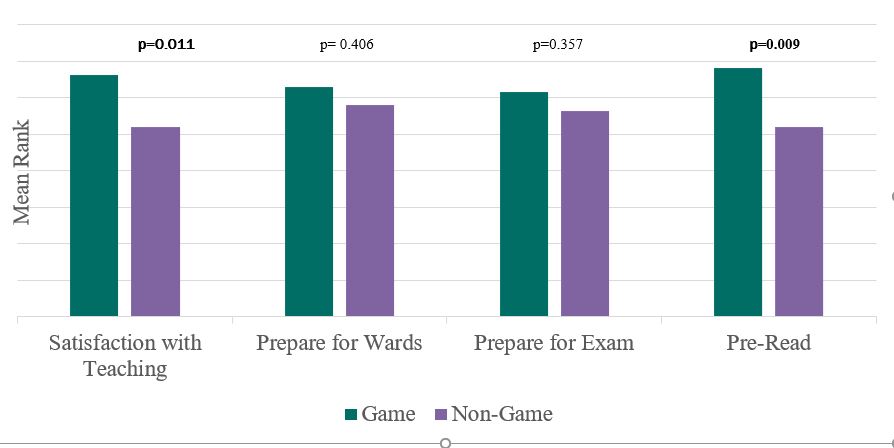Medical Education 11: Innovations across the continuum
Session: Medical Education 11: Innovations across the continuum
249 - To Game or Not to Game? Impact of Game Based Learning in Medical Education
Monday, April 28, 2025
7:00am - 9:15am HST
Publication Number: 249.6758
Austin C. Cummings, Medical College of Wisconsin, Wauwatosa, WI, United States; Erica Chou, Medical College of Wisconsin, Wauwatosa, WI, United States; Robert Treat, Medical College of Wisconsin, Milwaukee, WI, United States; Sara M. Lauck, Medical College of Wisconsin, ELM GROVE, WI, United States
- SL
Sara M. Lauck, MD (she/her/hers)
Assistant Professor
Medical College of Wisconsin
ELM GROVE, Wisconsin, United States
Presenting Author(s)
Background: There are many formats for medical student education, and interactive educational sessions have been found to be more effective for learning than lectures in undergraduate and graduate education. The influence of game-based sessions on pediatric medical knowledge has not been studied.
Objective: The goal was to determine the effectiveness of game-based teaching for pediatric clerkship third-year medical students. Prior study showed subjective enjoyment; however, this study was performed to compare effects of game vs non-game sessions on pediatric medical knowledge performance and student preparation and perspectives on the sessions.
Design/Methods: Pediatric clerkship students participated in educational sessions covering four content areas, presented in either game or non-game question-based format. A questionnaire was administered before and after with questions from or modified from the AAP, PREP Self-Assessment program. The post-sessions questionnaire also inquired about satisfaction, preparation provided by the sessions, and frequency of student preparation for the sessions. Deidentified data was analyzed via independent and dependent comparative analysis.
Results: 121 students completed both pre/post questionnaires. A repeated measures analysis of variance (ANOVA) revealed improved mean performance from pre to post sessions (p < 0.001) for both the game and non-game cohorts, higher mean performance in the game vs non-game group (p < 0.001) both pre and post sessions, and no significant difference in the change in performance pre and post sessions in the game cohort compared with the non-game cohort (p=0.612) (figure 1). There were no significant differences in performance with game vs non-game pre-scores (p=0.171) and post-scores (p=0.071) (figure 2). Mann-Whitney U-tests reported significantly higher mean rank satisfaction with teaching scores (p=0.011) and frequency of pre-reading preparation (p=0.009) for game vs non-game sessions (figure 3).
Conclusion(s): All sessions resulted in a gain of knowledge, with no significant differences between game or non-game sessions, although game sessions trended higher. Confounders of variable clinical experiences and timing of clerkship sessions were controlled by alternating the game session at the beginning or the end of rotation; however, individual knowledge and studying limited the effect of sessions on performance. Students reported increased satisfaction and preparation for the games suggesting that game-based teaching is a viable method for medical education. Future studies are needed to determine impact on long-term knowledge retention.
Figure 1 Game Vs. Non-Game Performance

Figure 2 Independent T-Tests in Game Vs. Non-Game Teaching For Performance
.jpg)
Figure 3 Game-Based Teaching Mann-Whitney U-Test


